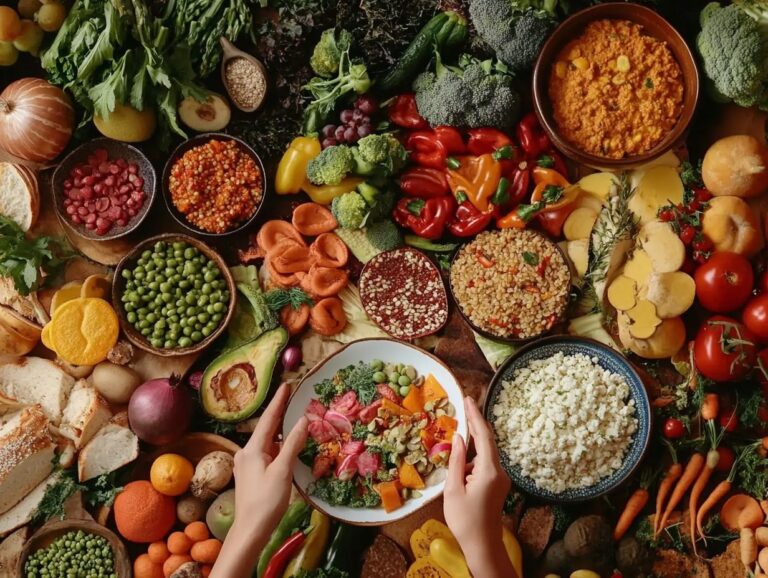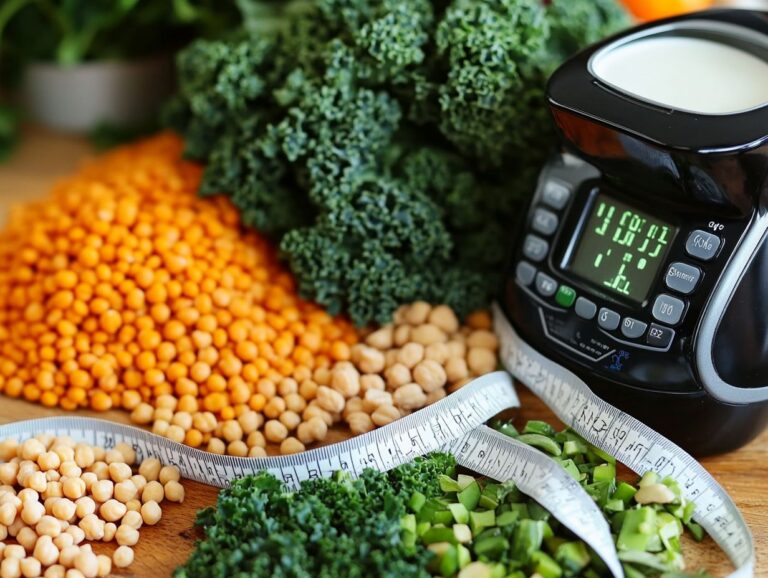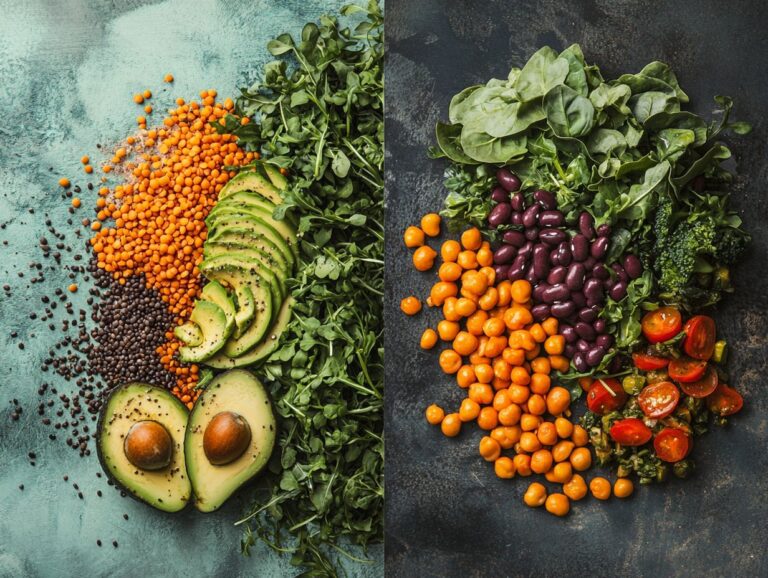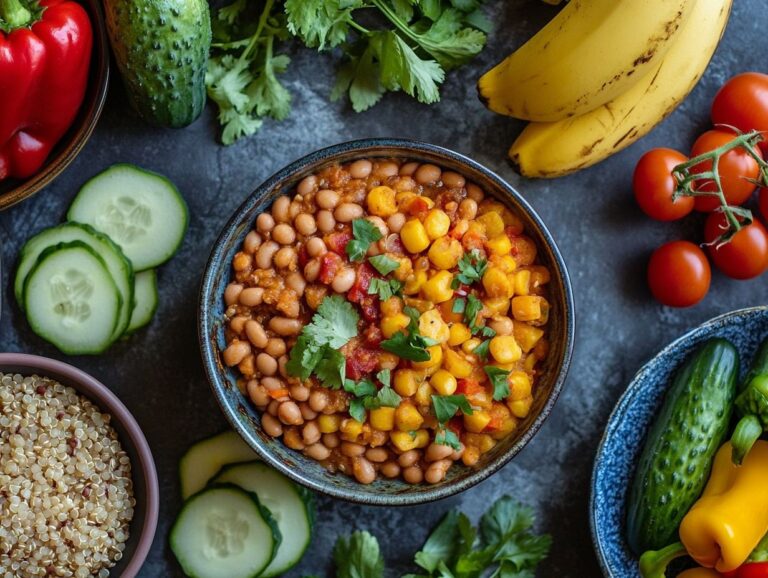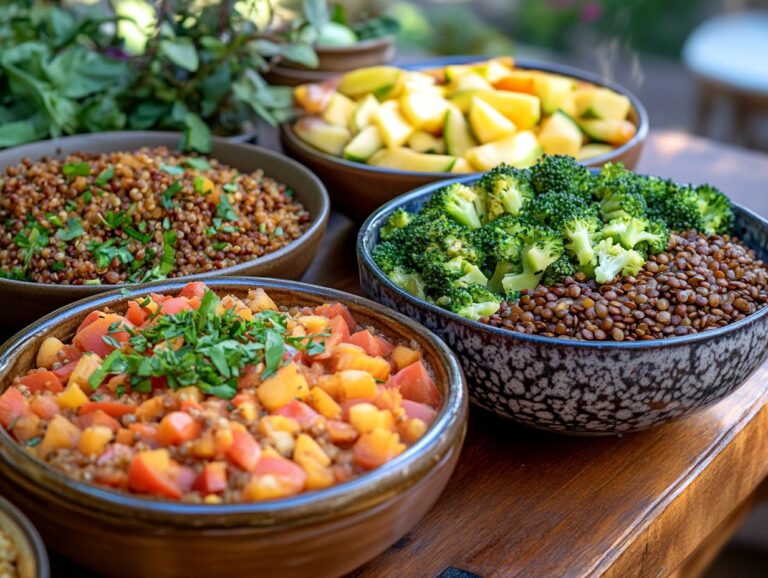Small Intestinal Bacterial Overgrowth, commonly known as SIBO, is a health condition that can result in uncomfortable symptoms and digestive distress. Understanding its causes, such as the imbalance of gut bacteria and nutritional deficiencies, and effects is the first step toward effectively managing this condition. This article explores how adopting a vegan diet can play a significant role in addressing SIBO, highlighting beneficial foods as well as those to avoid. Additionally, it discusses alternative treatment options, including the Low-FODMAP diet and elemental diet, offers tips for transitioning to a vegan lifestyle, and examines whether this diet can truly cure SIBO. Dive in to discover a path toward better digestive health and a healthy gut!
Key Takeaways:
- A vegan diet, which is a type of plant-based diet, can help manage symptoms of SIBO, a condition caused by an overgrowth of bacteria in the small intestine.
- Foods to avoid on a vegan SIBO diet include high FODMAP foods, gluten, and dairy, while foods to include are non-starchy vegetables, plant-based proteins, Legumes, and gluten-free grains.
- While a vegan diet can be beneficial for managing SIBO, it should be used in conjunction with other treatment options and should be carefully planned and monitored for success and potential side effects.
What Is SIBO?
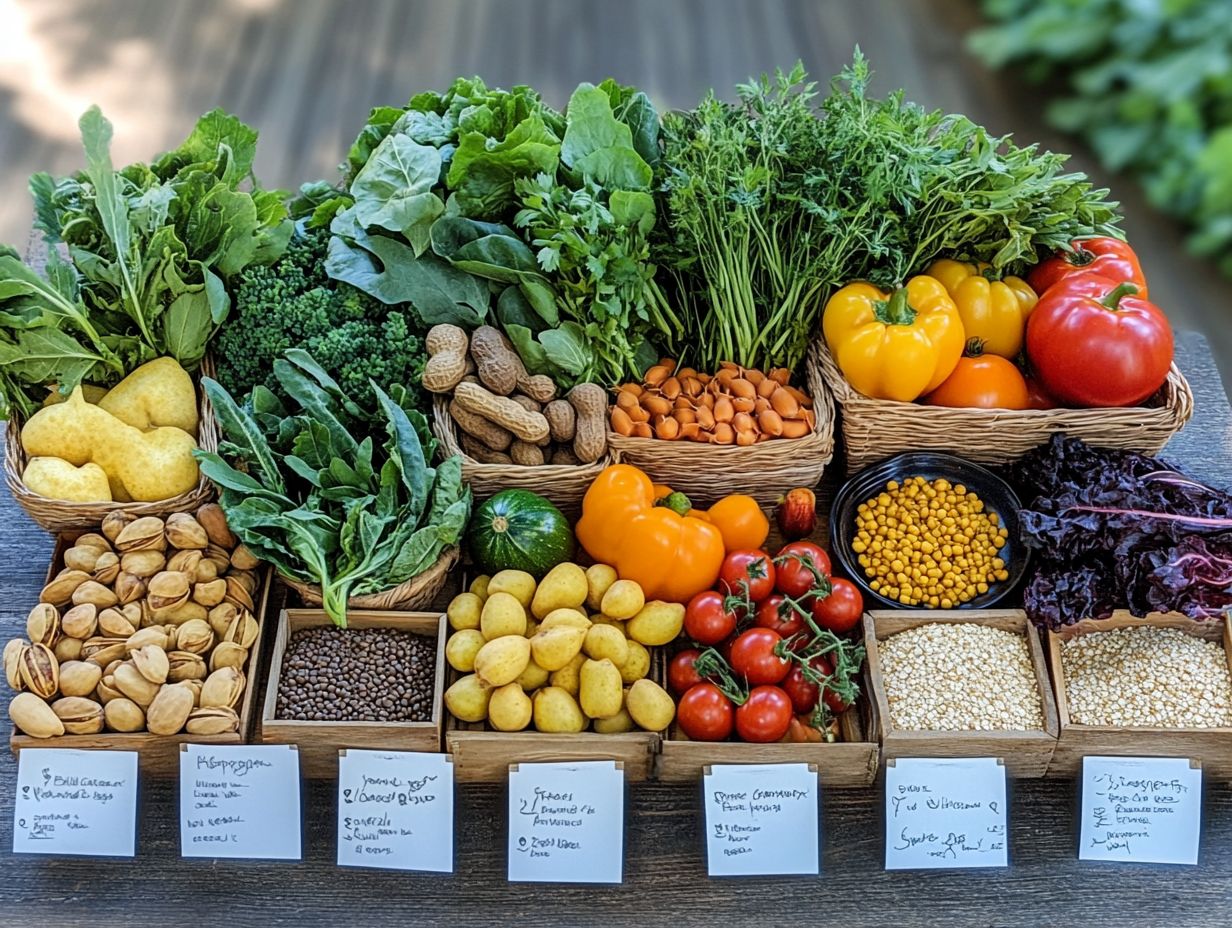
Small Intestinal Bacterial Overgrowth (SIBO) is a complex health condition marked by an excessive growth of bacteria in the small intestine, which can lead to a range of digestive health issues.
This overgrowth disrupts the normal balance of gut bacteria, resulting in symptoms such as bloating, diarrhea, and nutritional deficiencies. Understanding SIBO is essential for individuals experiencing digestive distress.
Consulting a healthcare provider, such as those affiliated with the University of Virginia Health System, can help identify appropriate treatment options, which may include antibiotics, probiotics, and dietary modifications aimed at restoring gut health.
What Are the Symptoms of SIBO?
The symptoms of Small Intestinal Bacterial Overgrowth (SIBO) can vary widely, with common issues including bloating, diarrhea, abdominal pain, and excessive gas production.
These symptoms can significantly affect digestive health and may lead to further complications if not addressed promptly. Individuals experiencing these symptoms often find their daily lives severely impacted, which may include irregular eating habits, social isolation due to embarrassment, or chronic fatigue resulting from nutrient malabsorption.
Inflammation in the gut can exacerbate these symptoms, creating a cycle that may also involve nausea and weight loss. Recognizing these warning signs is crucial, as early diagnosis using methods like the Lactulose Breath Test and treatment can alleviate discomfort and prevent long-term effects on overall health, thereby improving quality of life and restoring essential digestive balance.
What Causes SIBO?
Individuals with underlying health conditions, such as Crohn’s disease and irritable bowel syndrome, often experience poor digestive health, which can contribute to the development of small intestinal bacterial overgrowth (SIBO).
These conditions can disrupt the normal balance of gut bacteria, leading to SIBO. The condition is frequently caused by the small intestine’s inability to effectively clear bacteria, a problem that may be exacerbated by medications like antibiotics that alter gut flora.
Additionally, conditions such as diabetes or hypothyroidism can impact gut motility, resulting in stagnant food and subsequent bacterial overgrowth. For instance, a patient with diabetes may experience delayed gastric emptying, increasing the risk of SIBO, as highlighted in the American Journal of Gastroenterology.
Proton pump inhibitors and other medications that reduce stomach acidity can also promote bacterial overgrowth, as bacteria thrive in less acidic environments. These imbalances can result in uncomfortable symptoms, including bloating and diarrhea, and may also lead to nutrient malabsorption, negatively affecting overall health.
How Can a Vegan Diet Help with SIBO?
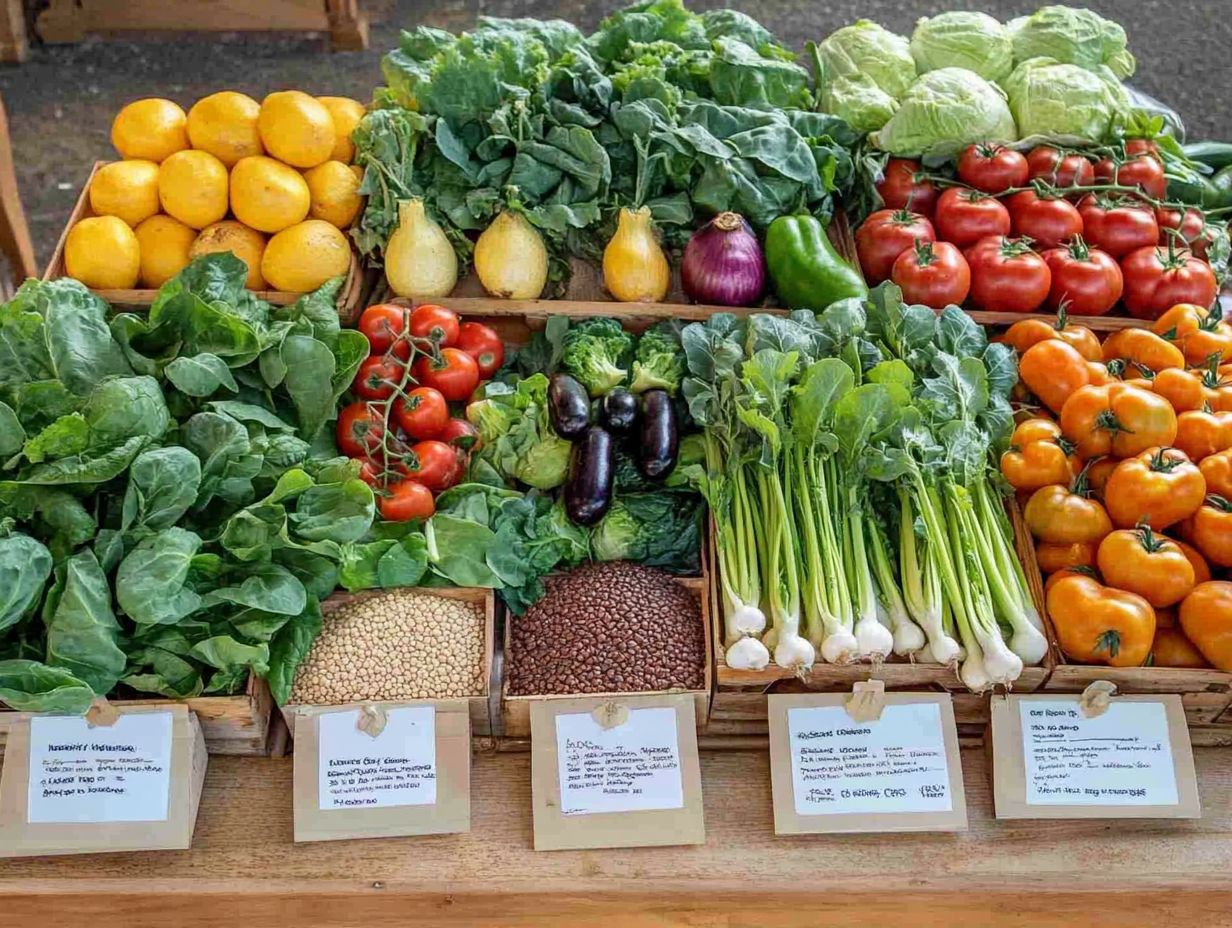
A vegan diet, which is a form of vegetarian diet, can be highly beneficial for individuals with SIBO, as it is rich in plant-based foods that are typically low in carbohydrates and can help reduce gut inflammation.
Consuming a vegan diet that emphasizes whole, anti-inflammatory foods may alleviate the symptoms of SIBO and promote healthy digestion.
What Are the Benefits of a Vegan Diet for SIBO?
A vegan diet offers several advantages for individuals with SIBO, including improved digestive health, reduced inflammation, and a diverse range of plant-based foods that support gut health.
By prioritizing anti-inflammatory foods, individuals may experience a reduction in SIBO symptoms and an enhancement of their gut microbiome. Leafy greens such as spinach and kale, along with anti-inflammatory options like turmeric and ginger, are particularly beneficial for digestive health, supported by antioxidants and probiotics.
These nutrient-dense foods are rich in fiber and antioxidants, helping to maintain a healthy balance of gut bacteria. Legumes, such as lentils and chickpeas, provide plant-based protein while promoting a feeling of fullness and aiding in regular digestion.
Additionally, whole grains like quinoa and brown rice serve as a nutritious base for meals and can be easily incorporated into salads or stir-fries.
By developing a daily meal plan that emphasizes these types of foods, individuals can effectively maintain a vegan lifestyle while also managing their SIBO condition more effectively.
What Foods Should Be Avoided on a Vegan Diet for SIBO?
SIBO Vegan Diet Food List: When following a vegan diet for SIBO, it is important to avoid foods that are high in carbohydrates and fermentable fibers, as they can exacerbate symptoms.
Legumes, high-FODMAP fruits, and certain grains can negatively affect the balance of gut bacteria and should be minimized to promote a healthier gut environment. Additionally, specific vegetables such as onions, garlic, and artichokes are problematic due to their high oligosaccharide content. Avoiding these foods can significantly reduce the amount of fermentable material available to harmful bacteria, thereby alleviating bloating and discomfort.
A low-FODMAP approach can be particularly beneficial, as it emphasizes easily digestible food options that help reduce symptoms. This diet encourages the consumption of low-FODMAP alternatives, including the following options suitable for a vegan SIBO diet:
- zucchini
- spinach
- gluten-free grains
What Foods Should Be Included in a Vegan Diet for SIBO?
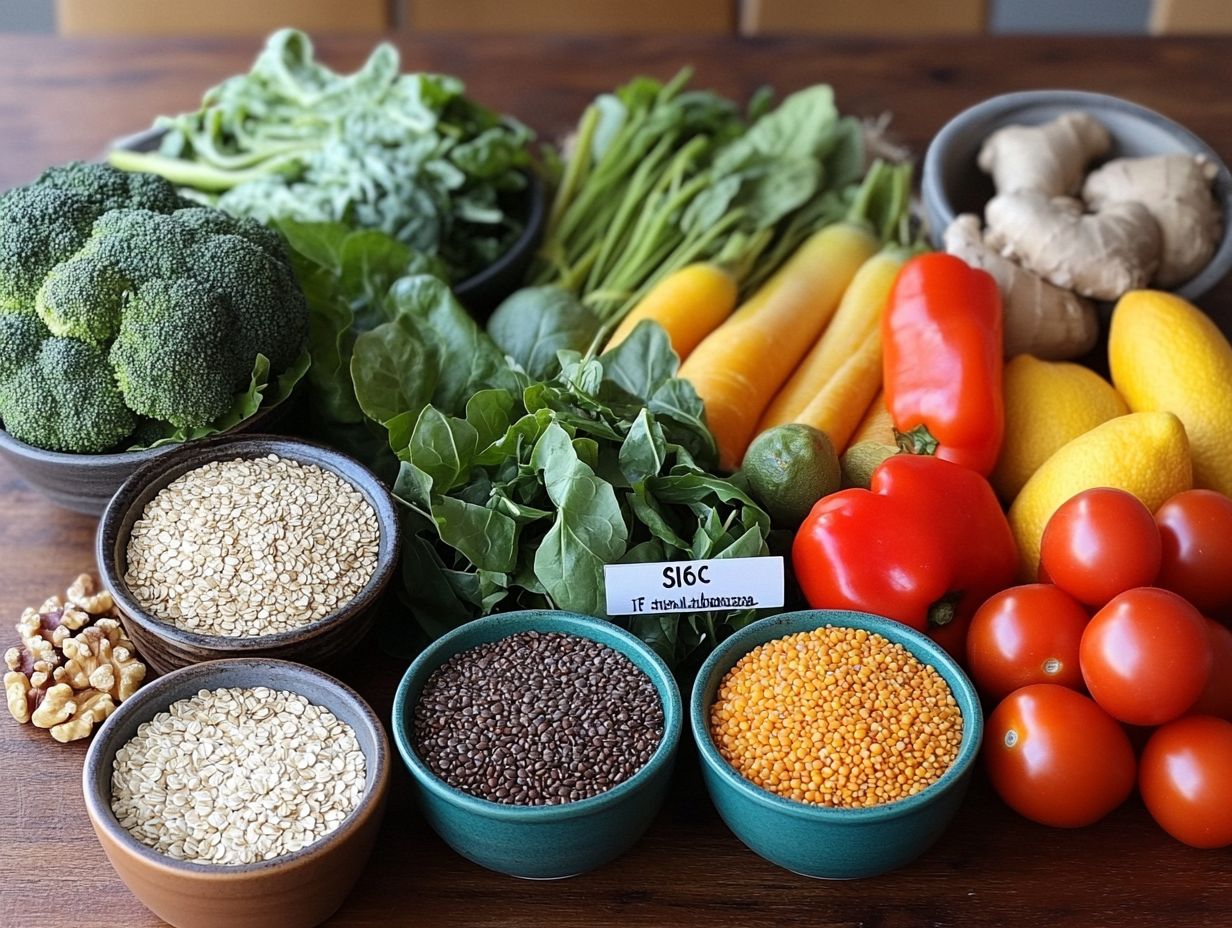
Choosing specific foods for a vegan diet that supports SIBO management is crucial, as these foods can alleviate symptoms and promote digestive health.
Incorporating foods rich in probiotics, fiber from low-FODMAP vegetables, and anti-inflammatory spices can help support gut health while minimizing discomfort. For a vegan diet, it’s important to select plant-based sources of these nutrients.
Fermented options like:
- sauerkraut
- kimchi
- non-dairy yogurts
provide beneficial bacteria that enhance gut flora. Low-FODMAP vegetables such as:
- spinach
- zucchini
- carrots
- bell peppers
can be easily added to meals, ensuring adequate fiber intake without triggering symptoms. Additionally, anti-inflammatory foods like turmeric and ginger not only enhance flavor but also support overall gut healing.
Together, these foods create a balanced diet that aims to reduce SIBO-related issues and make digestion easier and more comfortable, echoing insights from experts like Barbara Bolen, PhD, and Emily Dashiell, ND.
Is a Vegan Diet the Only Solution for SIBO?
Although a vegan diet can be an effective method for managing SIBO, it is not the only option available. Individuals may explore various treatments, including guidance from healthcare professionals and resources like the Functional Nutrition Library, to learn about a wide range of dietary approaches like the elemental diet and medical approaches that can help alleviate symptoms through the use of a feeding tube in severe cases.
What Other Treatment Options Are Available for SIBO?
Other treatment options for Small Intestinal Bacterial Overgrowth (SIBO) may include antibiotics, which can help decrease bacterial overgrowth, as well as probiotics that support gut health and restore a balanced microbiome within the GI tract.
It is essential to consult with a healthcare provider to determine the most appropriate treatment plan tailored to individual needs.
How to Transition to a Vegan Diet for SIBO?
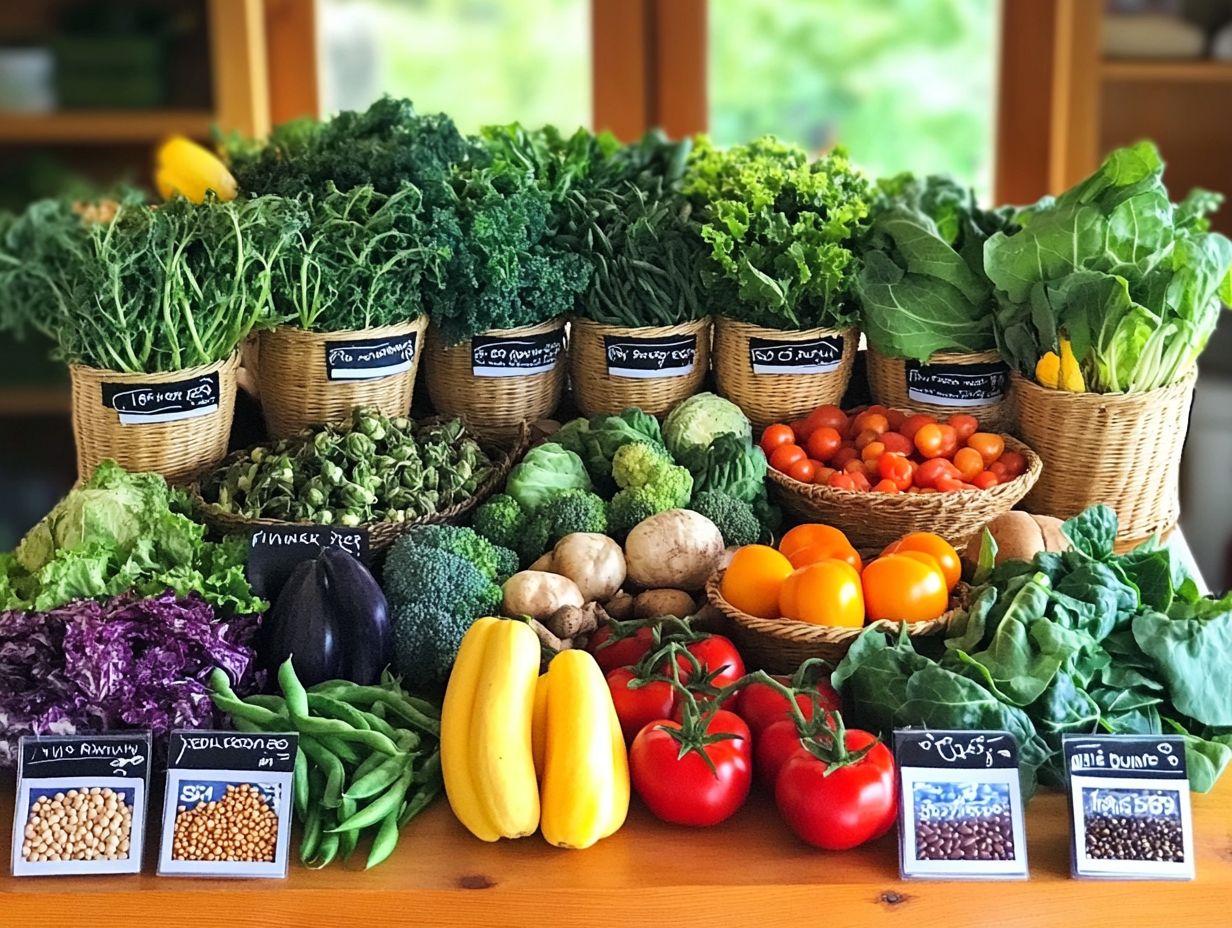
Transitioning to a vegan diet for managing SIBO is best approached gradually, as this method helps maintain digestive health during the shift.
A gradual transition to a plant-based diet allows individuals to adjust more comfortably and ensures that their nutritional needs are met without exacerbating SIBO symptoms.
What Are the Steps to Transition to a Vegan Diet for SIBO?
Transitioning to a vegan diet for those with SIBO requires careful meal planning, a gradual removal of non-vegan foods, and the inclusion of low-FODMAP plant-based options to minimize digestive disturbances.
To start this process, it is essential to create a well-thought-out meal plan that focuses on low-FODMAP foods, such as zucchinis, spinach, and rice, which can support you during the transition phase.
Gradually eliminating high-FODMAP items like wheat, garlic, and certain legumes allows the body to adjust without shocking the digestive system. Replacing these with nutrient-rich alternatives, such as quinoa or fermented plant proteins, helps ensure adequate nutrient intake.
Additionally, keeping a food diary can be beneficial for tracking triggers and monitoring any changes in symptoms, which can aid in the successful transition to a vegan diet.
What Are Some Tips for Maintaining a Vegan Diet for SIBO?
A vegan SIBO diet, which aligns with a Low-FODMAP diet approach, can be effectively maintained through careful meal preparation, thoughtful food choices, and diligent symptom monitoring, all of which contribute to a healthy digestive tract. Following specific tips for proper planning can enhance adherence to the diet during the elimination phase.
- Firstly, meal planning and preparation can significantly reduce the likelihood of opting for off-plan foods when cravings or hunger strike.
- Secondly, incorporating low-FODMAP vegetables such as zucchini and spinach can introduce a variety of flavors while still adhering to SIBO-friendly guidelines. Additionally, adding antioxidants and probiotics can support gut health.
- Additionally, including gluten-free grains like quinoa or rice can provide the necessary energy for daily activities without exacerbating symptoms.
Those following a vegan SIBO diet should consider keeping a food journal to track their meals and symptoms, noting any instances when symptoms worsen. This practice can help identify personal triggers and allow for dietary adjustments to better meet individual needs.
Finally, joining support groups and exploring recipe websites that offer SIBO-friendly vegan meal ideas can provide essential motivation and inspiration for maintaining this lifestyle.
Can a Vegan Diet Cure SIBO?
A vegan diet can assist in managing the symptoms of SIBO and enhancing digestive health; however, it may not always cure the condition. The inclusion of an Elemental Diet or consulting experts like Barbara Bolen, PhD, or Emily Dashiell, ND, could provide further insights.
The extent to which dietary changes can help will depend on individual factors and other underlying health issues related to gut bacterial balance.
What Are the Success Rates of Using a Vegan Diet to Treat SIBO?
The success rates of using a vegan diet to treat SIBO (Small Intestinal Bacterial Overgrowth) vary among individuals, with many reporting improvements in digestive health and symptom management.
Achieving success often depends on adherence to the diet as well as the incorporation of additional treatment options alongside these dietary changes, including regular monitoring through a Lactulose Breath Test.
Are There Any Risks or Side Effects of Using a Vegan Diet for SIBO?
A vegan diet may offer benefits for individuals with SIBO, but it also carries potential risks and side effects, particularly nutritional deficiencies if not carefully managed. It is essential for individuals on a plant-based diet to ensure they obtain adequate nutrients to maintain overall health without including animal products.
Without proper attention to meal planning, someone following this diet may not receive sufficient vitamins and minerals, especially Vitamin B12, iron, and omega-3 fatty acids, which are typically abundant in animal sources. The challenges are similar to those faced by individuals with Crohn’s disease, as discussed in studies by institutions like the University of Virginia Health System and published in the American Journal of Gastroenterology.
Additionally, a high-fiber diet consisting of legumes and grains may exacerbate SIBO symptoms for some individuals, leading to increased gas and bloating. Therefore, those who choose this lifestyle should include a diverse range of foods and may need to supplement certain nutrients. For more information, resources like the Functional Nutrition Library could prove beneficial.
Consulting with a healthcare professional can provide tailored recommendations to help meet nutritional needs while minimizing negative effects.

